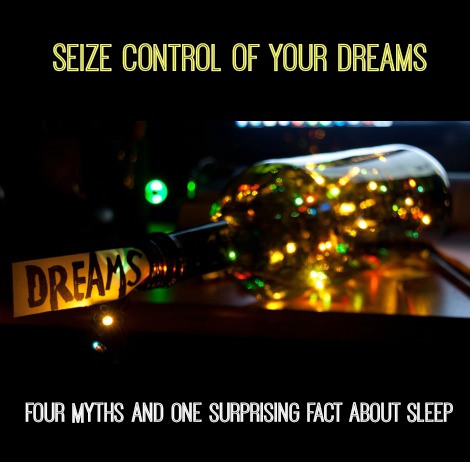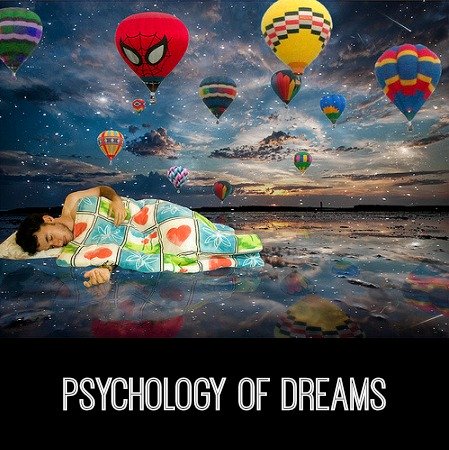Psychology Classics On Amazon

Seize Control of Your Dreams
Dr. Christian Jarrett
Considering how much of our lives we spend sleeping – years and years, if you added up all our time in slumber – it’s remarkable how much mystery still surrounds this most fundamental of behaviours. Mystery of course is the perfect breeding ground for myths.
We Need Eight Hours
Even this most trusted tenet of folk wisdom has been challenged recently. Hundreds of historical records show that until the late 17th century, the norm used to be for two separate sessions of sleep interspersed with a period of one to two hours nocturnal activity. Some experts believe this is our more "natural" inclination, and the frustrations of insomniacs who wake in the middle of the night could be related to these old instincts for having two periods of sleep.
The Sleeping Brain is at Rest
Since scientists started studying sleep seriously in the 1950s, we’ve learned a lot about the relevant basic physiology. We know that the brain is remarkably busy whilst we sleep, contrary to the folk idea that it’s a chance for our minds to switch off. Sleep is associated with four distinct phases, which are repeated in 90 minute cycles. Each cycle consists of three phases of non-rapid-eye-movement sleep, also known as "slow wave sleep" or "orthodox sleep" (which takes up about 80 per cent of a typical night), and there’s a phase of REM (rapid eye movement) sleep, which is particularly associated with dreaming and lively neural activity.
Teenagers Are Just Lazy
Most teenagers stay up late and then lie in through the morning, dead to the world. It’s tempting to think they’re just being lazy but in fact the evidence is mounting that the teenage body clock really is set differently from an adult’s. A survey published in 2004 of over 25,000 Swiss and German people compared the time of day they slept to when they didn’t have any social obligations. This time became progressively later through adolescence, peaking abruptly at the age of 20.
Another study published in 2010 found that adolescents, more than adults, suffered daytime sleepiness when they were forced to adhere to a strict 8-hour-a-night sleep schedule for several days. There’s also evidence from Mary Carskadon’s sleep and chronobiology lab at E.P. Bradley Hospital in Rhode Island that melatonin (a hormone involved in regulation of the sleep cycle) continues to be secreted at a higher level later into the day among older teens.
Dreams Are Filled With Symbolism
Sigmund Freud famously believed that dreams were the "royal road to the unconscious". He argued that nightmares and dreams are filled with symbolism, which if decoded, could reveal our deepest desires and fears. It’s a popular idea, with many people struggling to believe that the intricate events of their dreams could be entirely meaningless.
The simple truth is there’s little evidence that dreams have any useful meaning. At least one influential neurobiological theory contends that dreams originate from sporadic neural activity in the brain stem and the random activation of memories. By this account, dreams are the consequence of our higher brain areas attempting to translate this haphazard activity into some kind of coherent subjective experience.
A pertinent recent survey of 15 paraplegics found that they often walked in their dreams, but they walked less often than able-bodied comparison participants did in their dreams, and the researchers, led by Marie-Thérèse Saurat, concluded that these results were incompatible with Freudian theory. The paraplegics were quite open about their strong desires to walk again and if dreams act as an outlet for wish-fulfilment, you’d expect paraplegics’ dreams to be far more dominated by walking than they were.
We Can Take Control of Our Dreams
Inception Trailer
In Christopher Nolan’s 2010 film Inception, Leonardo DiCaprio’s character is one of several people with the expertise and technical equipment to get inside other people’s dreams and interfere with the way events unfold. This technology remains a fantasy, but the film was apparently inspired by the real phenomenon of lucid dreaming.
Lucid dreaming is the often enjoyable state of being partly awake whilst dreaming and having the ability to control the dream. The state occurs most often towards the end of a period of sleep, just when you’re in that twilight zone between dreamland and waking up.
If you’ve never had a lucid dream, there are tips out there for how to make the experience more likely. In the e-book Control Your Dreams by University of Sheffield psychologist Tom Stafford and lucid dreamer Cathryn Bardsley, it’s recommended that you practice noticing whether you’re awake or asleep. By day this sounds daft, but if you get into the habit when you’re awake then it’s more likely that you’ll be able to make the distinction when you’re sleeping.
Flicking a light switch is a good test of whether you’re really awake, the authors say, since in your dreams the light levels won’t change. By contrast, pinching yourself is actually a bad test, because it’s all too easy to actually dream the act of pinching oneself. If you do become aware of being in a dream, then try to stay calm because if you get too excited you’ll probably wake yourself up. Finally, set yourself goals to aim for the next time you do manage to achieve lucidity in a dream. "Flying. Always good," Stafford and Bardsley write. "Sex. Popular. And consequence free."
The Psychology of Dreams
If you would like to learn more about the psychology of dreams, All-About-Psychology.Com has a page dedicated to the topic which you can access via the following link.
This Lucid Dreamer T-Shirt is available from Amazon (prime eligible) in a range of colors for women and men. Sales help support this website, which has been providing free and comprehensive information and resources for psychology students and educators since 2008.
Recent Articles
-
All About Psychology
Apr 15, 25 10:41 AM
A psychology website designed to help anybody looking for detailed information and resources. -
Billy Milligan Case Study: Psychology, Crime, and the Split Mind
Apr 15, 25 08:02 AM
Was Billy Milligan a fractured victim—or a manipulative genius? This Billy Milligan case study explores the psychology behind one of history’s most controversial trials. -
Cute Aggression Explained: Why We Want to Squeeze Adorable Things
Apr 09, 25 01:24 PM
Overwhelmed by cuteness? Discover the science behind cute aggression, the brain's quirky way of handling too much joy. You’ll never see cute the same again.
Know Someone Interested in Dreams?
Please help support this website by visiting the All About Psychology Amazon Store to check out an awesome collection of psychology books, gifts and T-shirts.









New! Comments
Have your say about what you just read! Leave me a comment in the box below.